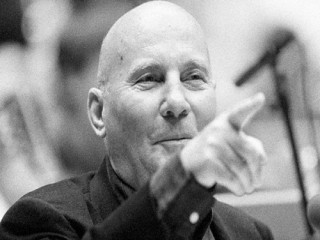
Hans Werner Henze biography
Date of birth : 1926-07-01
Date of death : -
Birthplace : Gütersloh, Westphalia
Nationality : German
Category : Arts and Entertainment
Last modified : 2011-06-07
Credited as : Composer, Boulevard Solitude,
Hans Werner Henze is a German composer of unusual productivity and diversity of style. He is best known for unorthodox operas such as Boulevard Solitude (1952), with its unique treatment of the "Manon" story used by Puccini, and the comic opera Der junge Lord (1965). His later works show his political affiliation with socialism, as in a requiem for Che Guevara, the Cuban revolutionary.
Born in Gutersloh, Germany, on July 1, 1926, Hans Werner Henze majored in piano and percussion at the Staatsmusikschule in Braunschweig. He was drafted into the Germany army in 1943 and served in the tank corps before being taken prisoner by the British.
After World War II, Henze became a student of composer Wolfgang Fortner at Heidelberg. The style of Henze's first mature compositions—a violin sonata, a chamber concerto, and the First Symphony (1947)—was neoclassic in the manner of Igor Stravinsky and Bela Bartok. After his introduction to the 12-tone technique, Henze's next scores showed his mastery of this technique: the piano variations and a violin concerto (1948); Symphonies no. 2 (1949) and no. 3 (1951); a piano concerto (1950); The Idiot (1952), a ballet; the First String Quartet (1952); and a Wind Quintet (1953). He also exploited jazz idioms in Jack Pudding (1951) and Maratona di danza (1956).
Henze was musical director of the German Theater in Konstanz (1948-1950) and composer and adviser on ballet for the Wiesbaden State Theater (1950-1952).
Henze considers his opera Konig Hirsch (1952-1956) and the Fourth Symphony (1955-1963) as the end of his "exploratory" period. In his later compositions many styles and techniques are assimilated, including polytonality, neoclassicism, romanticism with elements of jazz, and an Italianate lyricism. Out of these, says Joseph Machlis (1961), Henze "forged an original language marked by brilliance of instrumentation, rhythmic urgency, and lyric intensity." His theatrical works, especially, aroused heated controversy because of the bold librettos and astringent musical idiom.
In 1959 Henze won the Berlin Kunstpreis and in 1962 the Grand Prize for Artists at Hanover. In 1961 he became professor of composition at the Mozarteum in Salzburg.
Henze's important compositions include Undine (1958), a ballet; The Prince of Homburg (1960), a semihistorical opera; Elegy for Young Lovers (1961), with a libretto by W.H. Auden and Chester Kallman; and The Bassarids (1966), an opera with a libretto by Auden and Kallman, which many consider Henze's most felicitous score. He also wrote the Second Piano Concerto (1968); an oratorio, Das Floss der Medusa (1969); Concerto for Double Bass (1969); and the opera El Cimarron (1970).
In 1963 Henze remarked: "The twelve-tone problem does not now play a great part in my music. … I have always been concerned with musical substance, particularly with melody, and have tended to express the most difficult musical processes in the simplest forms I could devise. My music has as much to offer the naive listener as it has for the expert who can base his judgment on extensive technical knowledge."
Henze visited the United States in 1963 for the world premiere of his Fifth Symphony, performed by the New York Philharmonic for the inaugural of Lincoln Center for the Performing Arts in New York City.
Hans Werner Henze continues to capture the attention of music critics. The English National Opera celebrated his 70th birthday in 1996 by performing some of his works. His Symphony no. 7, which was called "bone-rattling and exciting," was reviewed in Stereo Review (April 1994), by David Patrick Stearns, who claims that Henze has "been through more stylistic changes than Madonna."
















